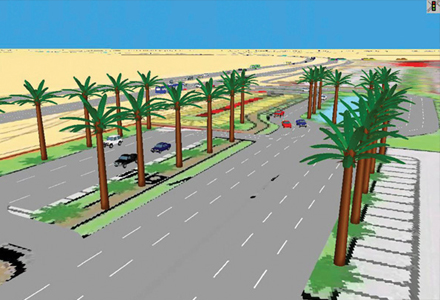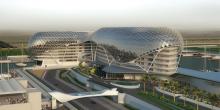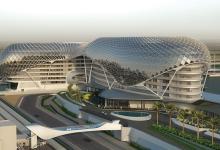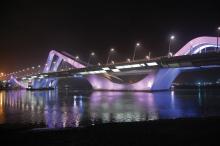
The INTERMAT Middle East event is being launched at a pivotal time of major infrastructure development in the region
As with most sectors, the highways industry has not had a fantastic 18 months in the Gulf. Not only has the recession impacted the delivery of projects across the board, GCC Governments' attention have been switching increasingly to rail, as plans to roll out a Gulf-wide rail system gather steam. GCC countries will invest over US$119.6 billion in infrastructure projects over the next decade and rail projects will account for over 90% of the investment, according to a 2010 study by research companyBut rail development is very much the future and with oil prices nudging three figures, and domestic and international confidence in the region slowly returning, the omens for the highways sector in 2011 appear favourable.
In the UAE, still the fulcrum of much of the region's intra-regional and international trade, transport infrastructure is identified as a pivotal sector, with the government increasingly keen to embrace the private sector in terms of expertise and funding. The UAE construction industry is expected to grow at a compounded annual growth rate (CAGR) of around 20% between 2010 and 2013, with rapid economic development driving construction and infrastructure developments. The UAE Government, led by the ministry of Economy, is preparing a set of new federal laws, including the Investment law designed to enhance further the position of the UAE as an attractive investment location.
Christopher Hudson is managing director of Mecom Forums, the local partner helping organise the INTERMAT Middle East event. The international exhibition for machinery, materials and equipment for construction and infrastructure is being held for the first time in Abu Dhabi and is being launched at a time of major road development in the region. This key exhibition will run simultaneously with the Arabian Construction Week and will capitalise on the huge potential for road and highway construction right across the Middle East. Hudson expects key players to attend the INTERMAT Middle East event, which will be an important focal point for the region's fast-growing and highly buoyant infrastructure sector.
During the last five years, GCC governments have been investing heavily in their road infrastructure, although this has not kept pace with the increase in the number of vehicles, leading to growing problems of congestion. Ironically, some of the investment in transport infrastructure has, in the short term, exacerbated the congestion problem due to ongoing construction work and the associated diversions and road blockages. Support infrastructure has lagged behind more prestigious mega-projects such as airports, business parks, and high-rise towers, leading to bottlenecks.
Dubai used to be crippled by congestion three years ago, primarily due to the runaway property boom which has since stalled, and now motorists reap the benefits, with jams the exception rather than the norm.
For all the much-publicised debt challenges facing
It has enabled the RTA to complete several key projects, while upgrading other arterial developments, across the emirate as other projects became entangled in the credit freeze, and will continue to be a critical money spinner moving forward..
Principal works include the maze of new bridges and roads surrounding the 1st Interchange of Sheikh Zayed Road, providing improved flow around Burj Khalifa (tallest tower), and Financial Center and Al Safa streets, which has been handled by Italian company Salini. The work is scheduled to be completed by December.
Another district which has seen radical road-building changes has been Mirdif, close to Dubai International Airport, where the ongoing expansion of residential properties and opening of the Mirdif City Centre mall has fuelled significant infrastructural changes. A 3.4km stretch of Al Khawaneej Road was expanded from three to four lanes, and a 1.6km area along Algiers Road widened from two to three lanes to improve intersection traffic flow.
The Metro has had a noticeable knock-on effect with a number of roads and bridges being built at key entry and exit points - such as Rashidiya Station, where the Red Line starts and ends, which offers park-and-ride facilities for 2,700 cars.
Engineer Maitha Bin Adai, CEO of Traffic and Roads Agency, said that the construction of bridges leading to the entries and exits of the Metro Station car parks dovetails with the RTA strategy to provide speed and smooth roads network for the road users to get to the Metro Stations. This fits with the master plan to upgrade mass transit modes and attract additional numbers of riders to reduce traffic jams.
In another significant move, the RTA opened Phase 4 of the Dubai Bypass Road linking up with Al Faya Road, Seih Shuaib, Abu Dhabi, better known as Trucks Road, which also serves Al Maktoum International Airport, following its opening in the summer. It features six lanes in each direction stretching 25km from the interchange of Dubai Bypass Road-Jebel Ali Lihbab Road up to Al Faya Road, Abu Dhabi Emirate. By opening Phase 4, RTA has completed all phases of the Dubai Bypass Road, starting from Sharjah Emirate at Al Sajaa Interchange and terminating at the exit point from Dubai Emirate to Abu Dhabi Emirate, in a 70km long stretch.
For all Dubai's allure, one of the most significant changes pre- and post-downturn has been the ongoing emergence of Abu Dhabi as an infrastructural force. Yas Tunnel, which connects Al Raha Beach to Yas Island - which recently hosted the season-closing F1 race - officially opened in October. The 1.1km long tunnel, which is 43m wide and has a height clearance of 4.5m, consists of six lanes and boosts connections between Yas Marina Circuit, Yas Island Hotels and Ferrari World Abu Dhabi to residential communities such as Al Bandar and Al Raha Gardens, and improves connection times to and from nearby Abu Dhabi International Airport.
The tunnel represents a key infrastructure component of Plan Capital 2030 and was developed following an agreement between the Abu Dhabi Urban Planning Council (UPC) and Aldar Properties. Abu Dhabi Ports Company recently awarded a contract to
Located midway between Abu Dhabi and Dubai in the Taweelah industrial district, KPIZ will commence operations in 2012 and over the long term to 2030 will comprise 420km2 of prime industrial land.
In a separate deal, ADPC awarded a contract to a joint venture between ED Zublin AG and Al Jaber Transport and General Contracting for KPIZ in July, which includes a 5.4km dual carriageway linking the offshore port to the mainland with associated service roads, street lighting and two helipads.
All eyes intra-regionally too are on Saudi Arabia, as contractors seek to secure a greater slice of the Saudi public spending pie. Transport Minister Jabara Al-Seraisry has signed a number of contracts worth $576 million to construct nearly 850km of new roads and bridges in various parts of the kingdom. The ministry has so far signed contracts for road projects approved in the current budget and contracts for six major projects are imminent.
Saudi Arabia's National Commercial Bank forecasts that the kingdom will award more construction contracts through the year within its post-crisis fiscal expansion strategy. The second quarter of 2010 saw a consistent increase in the value of awarded contracts, with the total deals awarded during the period nearly tripling during the first quarter, the bank said in its Construction Index Survey.
Elsewhere in the region, the $4 billion Qatar-Bahrain causeway linking the two Gulf states is among the headline projects, although it's currently delayed due to design, financial and technical issues.
Wade Adams wins DIC contract
Dubai Industrial City has appointed Wade Adams as contractors to finalise the second phase of infrastructure work, expected to be completed in October 2011. The scope of work includes the completion of all sewage, water and irrigation and remaining road works as well as the construction of telecommunication networks and DEWA electrical ducts.
ACW budgeting visitor increase
The Arabian Construction Week, taking place between the 28-30 March, 2011 at the Abu Dhabi National Exhibition Centre (ADNEC), will cover over 20,000 sq metres of exhibition space and around 10,000 delegates are expected to attend, 3,000 more than 2010. Organised by Mecom Forums/Clarion Events in partnership with MEED, Arabian Construction Week will serve as a perfect platform for companies to display a full range of green building, innovative building and engineering products and services.








